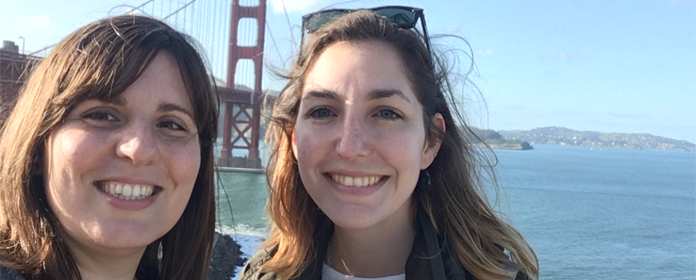Two University alumnae research possible treatment for coronavirus in California
Belén Pérez Solas from Navarra and María García-Cremades from Alicante have developed a model to optimize the dose of hydroxychloroquine applied to patients with Covid-19.

PHOTO: Courtesy
La pamplonesa Belén Pérez Solans and the alicantina María García-Cremades Miraformer students of the University of Navarra, have developed in California a model to optimize the dose of hydroxychloroquine given to Covid-19 patients.which has shown good results result in some patients. The study was recently published in the journal "Clinical Pharmacology & Therapeutics" of the American Society for Clinical Pharmacology and Therapeutics.
The two researchers, both former students of doctoral program of the School of Pharmacy and Nutritionare currently in the University of CaliforniaSan Francisco (UCSF), in a postdoctoral stay that aims to implement innovative and more effective treatments, and to establish a good framework prevention of infectious diseases such as HIV, tuberculosis or malaria. It is precisely that research that has led them to study hydroxychloroquine as a potential treatment for coronavirus-infected patients.
The scientists have related the pharmacokinetic characteristics of hydroxychloroquine to viral load levels in patients with severe acute respiratory syndrome (SARS-CoV-2), "thus integrating data available in the clinical setting with data of viral replication in vitro, and with information on adverse reactions at the cardiovascular level," says Belén Pérez.
The pharmaceutical research against coronavirus is currently focused on designing strategies to analyze and integrate all the information available of the drugs that have shown some efficacy in patients, according to María García-Cremades Mira. "Hence, at present, issues such as deciding the effective dose to treat patients infected with Covid-19 represent a major challenge given the scarcity of clinical trial results."
In this way, they have explored different dosing regimens that maximize efficacy and minimize drug toxicity with the goal to inform clinical trials of hydroxychloroquine in infected patients.
The researchers agree that this work highlights the importance of the research aimed at development of disease/pharmacokinetic/pharmacodynamic models that allow generating "in silico" scenarios, in order to individualize treatments in a more efficient way.
This way of working is similar to the one used by the group of Pharmacometry and Systems Pharmacology of the School of Pharmacy and Nutrition, which constituted the framework of their doctorates. Both were developed in the field of Oncology and were supervised by Iñaki Fernández de Trocóniz. They were carried out in partnership with the pharmaceutical business Eli&Lilly in the first case, and with the department of Medical Oncology of the Clínica Universidad de Navarratogether with Dr. Marta Santisteban, in the second case.




